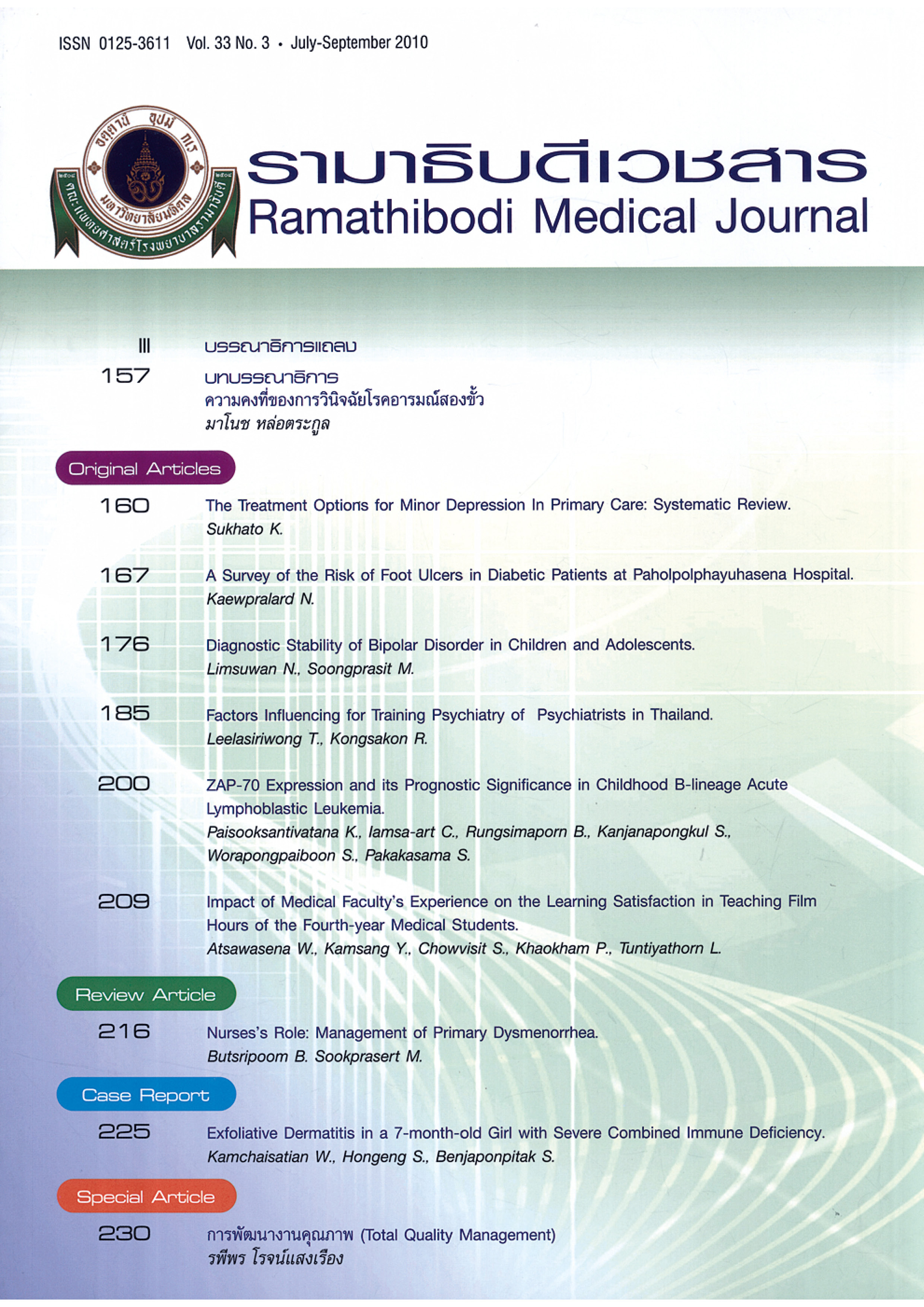Factors Influencing for Training Psychiatry of Psychiatrists in Thailand
Main Article Content
Abstract
Background: Stress in everyday life is increasing, resulting in more psychiatric patients. However, there are not enough psychiatrists in our country nowadays. A major strategy for promoting psychiatric recruitment may require information about factors influencing the post-grads to choose psychiatry.
Objectives: The aim of this study was to determine various factors influencing the selection of a psychiatric residency program and changes in influence of those factors.
Methods: Questionnaires were sent to all psychiatrists as shown in the mailing lists of Thailand Psychiatrist Association during Nov 23 to Dec 18, 2009. Chi-square test was used as a statistical analysis and the significant level was set at p < 0.05.
Results: Generally, the most important factor found was internal factor, i.e, favor, interesting in what might happen inside the minds, preferring to work with people's minds, belief in self-potential, and feeling of fitting in. The others were factors about the residency program and characteristics of the psychiatric field, and experiences during being medical students or working as general practitioners, respectively. During the last 10 years, there were differences in choosing how important the factors were, statistically significant, i.e. leisure time (p = 0.000), risk of work-related hazards (p = 0.007), and risk of being sued (p = 0.001).
Conclusion: The most influencing factor was the internal factor, individually. In current decade, the result showed that the factors concerning the hardship of the work and risks from the job were important and increasing. Thus, further investigations in depth are warranted.
Article Details
References
Srithanya Hospital Staffs, Kanchana K. Report of the Crisis in Thai People's Happiness. Department of Mental Health, Ministry of Public Health. Available from: URL:http://www.dmh.go.th/sty_libnews/news/view.asp?id=12646.
Srithanya Hospital Staffs, Kanchana K. Department of Mental Health, Ministry of Public Health. Available from: URL: http://www.dmh.go.th/sty_libnews/news/view.asp?id=12648.
World Health Organization. Atlas Mental Health Resources in the World, 2001. Available from: URL: https://www.who.int/mental_health/publications/mh_atlas_2001/en/.
Department of Mental Health, Ministry of Public Health. Report of Mental Health Thailand, 2007. Available from: URL: http://www.dmh.go.th/report/pdf/2550mhworker.pdf.
Department of Mental Health, Ministry of Public Health. Report of Mental Health Thailand, 2006. Department of Mental Health, Ministry of Public Health. Available from: URL: http://www.dmh.go.th/report/pdf/2549mhworker.pdf.
Sierles FS, Taylor MA. Decline of U.S. medical student career choice of psychiatry and what to do about it. Am J Psychiatry. 1995;152:1416-26.
Weintraub W, Plaut SM, Weintraub E. Recruitment into psychiatry: increasing the pool of applicants. Can J Psychiatry. 1999;44(5):473-7. doi:10.1177/070674379904400507.
Brockington I, Mumford D. Recruitment into psychiatry. Br J Psychiatry. 2002;180:307-12. doi:10.1192/bjp.180.4.307.
Kim WJ; American Academy of Child and Adolescent Psychiatry Task Force on Workforce Needs. Child and adolescent psychiatry workforce: a critical shortage and national challenge. Acad Psychiatry. 2003;27(4):277-82. doi:10.1176/appi.ap.27.4.277.
Sacks MH, Karasu S, Cooper AM, Kaplan RD. The medical student's perspective of psychiatry residency selection procedures. Am J Psychiatry. 1983;140(6):781-3. doi:10.1176/ajp.140.6.781.
Sledge WH, Leaf PJ, Sacks MH. Applicants' choice of a residency training program. Am J Psychiatry. 1987;144(4):501-3. doi:10.1176/ajp.144.4.501.
Weissman SH, Bashook PG. The 1982 first-year resident in psychiatry. Am J Psychiatry. 1984;141(10):1240-3. doi:10.1176/ajp.141.10.1240.
Santos AB, Roberts JM, Saunders BE. Variables influencing the choice of a psychiatry residency program. Acad Psychiatry.1988(12):129-33. doi:10.1007/BF03400002.
Davydow D, Bienvenu OJ, Lipsey J, Swartz K. Factors influencing the choice of a psychiatric residency program: a survey of applicants to the johns hopkins residency program in psychiatry. Acad Psychiatry. 2008;32(2):143-6. doi:10.1176/appi.ap.32.2.14.
Schwartz RW, Jarecky RK, Strodel WE, Haley JV, Young B, Griffen WO Jr. Controllable lifestyle: a new factor in career choice by medical students. Acad Med. 1989;64(10):606-9.
Deepenthum L. The comparative components of decision making to be a specialized doctro between psychiatists and the other fields: a case study of ministry of publice health. [master’s thesis]. Bangkok: Kasetsart University; 2000.
Benjaponpitak A. Mental Health Problems in Residents at Ramathibodi Hospital. J Psychiatr Assoc Thailand 1996;41(2):87-98.
Dorsey ER, Jarjoura D, Rutecki GW. Influence of controllable lifestyle on recent trends in specialty choice by US medical students. JAMA. 2003;290(9):1173-8. doi:10.1001/jama.290.9.1173.
Jarecky RK, Schwartz RW, Haley JV, Donnelly MB. Stability of medical specialty selection at the University of Kentucky. Acad Med. 1991;66(12):756-61. doi:10.1097/00001888-199112000-00011.
Kassebaum DG, Szenas PL. Factors influencing the specialty choices of 1993 medical school graduates. Acad Med. 1994;69(2):163-70. doi:10.1097/00001888-199402000-00027.
